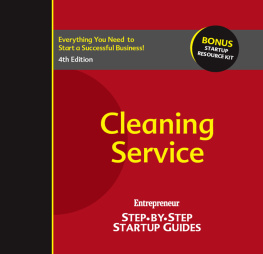How to Set up a NewBusiness
Entrepreneurs Brief Guide -Volume 1.2
Dr Jim Porter
This e-book consists of sixEntrepreneurs Brief Guides, addressing all you need to know aboutsetting up a new business. It contains independent and practicaladvice for entrepreneurs and small to medium sized businesses(SMEs). Designed to help your business achieve its daily objectivesof acquiring and retaining customers, this guide is invaluable toany start up company and small business owner.
Learn how to:
Apply for Grants
Search for Your Business Premises
Set up Your Office
Set up Your I.T. System
Insure Your Business
Recruit Skilled Employees
Copyright
How to Set up a NewBusiness
Dr Jim Porter
.
Revision:SW .01.2.001
Copyright 2011 All Rights Reserved.

Smashwords Edition
This ebook is licensed foryour personal enjoyment only. This ebook may not be re-sold orgiven away to other people. If you would like to share this bookwith another person, please purchase an additional copy for eachrecipient. If youre reading this book and did not purchase it, orit was not purchased for your use only, then please purchase yourown copy.
Thank you for respecting the hard work ofthis author.
No part of this publication may bereproduced, stored in a retrieval system, or transmitted in anyform or by any means without the written permission of theauthor.
ISBN:978-1-4661-5820-7
Publisher: Smashwords, Inc.
Chapter No. 1: How to Apply for Grants
While conducting yourmarket research prior to starting a business, you must find outabout the various types of grant schemes available. New grantschemes are often introduced, but you must have an idea as to whichkind of grants your business is eligible for and whether or not itis worth applying for them .
LEARN HOW TO:
Prepare for a grantapplication
Access possible grantschemes
Receive grant payments
While conducting yourmarket research prior to starting a business, you must find outabout the various types of grant schemesavailable. New grant schemes are often introduced, but you musthave an idea as to which kind of grants your business is eligiblefor and whether or not it is worth applying for them.
Your start up business may qualify fora grant or government support to help you get started.
Grants can be one of the best andcheapest sources of financing. For example, you might get asubsidized or zero-interest loan, or even an outright cash grant.In addition, support schemes can provide expert advice, informationor subsidized consultancy.
Before applying for grants
You must always be prepared to investyour own money in the capital instead of completely relying onoutside financial sources such as grants. Grants usually cover aminute percentage of the total financing required for anyproject.
If any grant scheme is ready tofinance your entire project, you will still have to invest yourtime, effort and resources in researching the availability of thatspecific grant scheme. Grants are usually available for specificprojects such as the introduction of a new training programetc.
Many of the grant schemes have certainrestrictions, such as they will fund only already begun projects orso. In this case you must convince them and demonstrate that youwill not be able to achieve your targets without theirgrant.
Before proceeding to apply for grants,ensure that you have a sound business plan to convince them of yourcredibility and commitment to developing your business.
Factors affecting grants
The kind of grant schemes and supportyou qualify for depends on a lot of factors:
The location where you start yourbusiness is a major factor for determining the grants available toyou. If you start your business in a special economic zone or in anarea where productivity is low and unemployment is high, you willhave better chances of obtaining grants through government andother financial institutions. Your local council may be able tohelp you in dealing with some problems in your chosen area forbusiness. Otherwise, you can contact your local developmentagencies.
Some grants are available only forspecific projects such as training programs, the launch of a newproduct or research and development etc. Other grants may focus onthe development of new business or boosting employment.
The industry you select to conductyour business in also affects the funding opportunities availableto you. Some sectors are given more importance over others and thushave comparatively higher opportunities to obtain grants and otherfinancial help. Also, avoid starting your business in an industrywhich is in decline or facing a financial crunch as fundingopportunities will be very limited. Industries such as tourism,culture or related to the rural sector are always encouraged by thecountrys government and therefore, you have more chances ofwinning grants for your business.
Certain businesses prefer to gainpractical support such as extra employees, equipment and machinery,rather than pure financial help such as grants.
Advantages and disadvantages
The main advantage ofgrants is cheap financing. For example, you might get a subsidizedor zero-interest loan, or even an outright cash grant. In addition,support schemes can provide expert advice, information orsubsidized consultancy.
However there aredisadvantages are:
there is strongcompetition for grant schemes - you may spend a lot of time on anapplication which is not successful
you must meet the scheme'scriteria - such as business location and size, and how you plan touse the money
the application procedurecan be complex and drawn out
you normally have to usethe grant for a specific project, rather than general businesscosts
grants usually only covera percentage of the costs - you also have to provide matchingfunds
Accessing possible grant schemes
As mentioned earlier, there arevarious grant schemes available and before you apply, you mustalways check whether your business is eligible for it or not. Somesteps to follow could be:
You can check with yourlocal business support organisations for a listor database of grant schemes available and then take the help ofyour business advisor in selecting the appropriate schemes to applyfor. This can usually be done without any cost beinginvolved.
You could alsogather subsidised information from othersources such as trade associations, regional banks, financialconsultancies etc. You can also log onto websites and search on theinternet.
Next, you must get in touch with themanagers or administrators of the particular schemes to ensure yourbusiness fits into their grant criteria.
After finding about the eligiblecriteria, you must then enquire about the amount of fundingavailable, the deadlines by which you must apply and when thegrants will be awarded.
Ask for their help in completing theapplication form, so that you dont miss anythingimportant.
Complete the form.
Do extensive research beforesubmitting your proposal and include in it your work plan, thedetails of the business, the benefits of the project you areundertaking and your own personal track record. Present yourproposal in a manner that suggests it is destined to be successful,as unimpressive projects are likely to be rejected.
You can take the professional help ofaccountants or consultants in order to apply for grants which offera large amount of money. However remember that you will be expectedto pay their fees even if your proposal has beenrejected.
Next page








